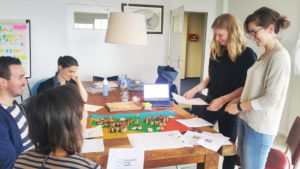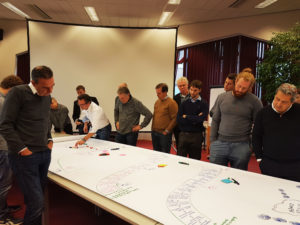What we do
What we do
DuneWorks brings together several scientific disciplines, such as anthropology, societal and technological studies, political science, social geography, innovation studies and industrial design. This diversity ensures that there is always attention for social, institutional, political and/or end user dimensions in our work. Based on this we work on solutions for issues concerning the transition towards an inclusive and sustainable climate. We do this by means of research, advice, workshops, trainings and project coordination.
Research
We perform research in order to give recommendations for (new) policies, to sustain real life practices and to develop new theories. Here we use several methods from data gathering and analysis, for example in-action-research, literature studies, case analysis, questionnaires and interviews, stakeholder analysis, context mapping, interactive learning methods and methods for monitoring and evaluation. This broad set of skills shows that we translate our research into practice and the other way around, mainly via the following aspects.

Advice

A lot of knowledge and skills about energy, climate and circularity doesn’t find its way to real life and the other way around. We bridge this gap between real life, policy and science by giving tailored advice. We do this by diving into the question together with our client and exploring the context. Here we integrate our scientific backgrounds and experiences in order to give an as complete and specific advice as possible.
Workshops and trainings
Many complex issues can only be solved by bringing together knowledge and experiences from a diverse group of stakeholders, for which workshops are a great means to make this happen. DuneWorks has a broad set of tools available to design and facilitate those workshops in order to stimulate the creation of new insights and new solutions.
Next to workshops we also offer training courses and education for professionals and students focussed on the delegation of knowledge and capacity building. The first one concerns social, institutional, political and/or end user dimensions, within themes such as behavioural change, participative democracy, environmental justice and open innovation in relation to energy and climate issues. Capacity building focusses for example on the setup of inclusive projects, how to take on the role as transition professional and to learn how to reflect upon processes.

Project coordination and support

DuneWorks has a lot of experience in the guidance, coordination and lead of projects and consortia. We do this at several stages in the project, ranging from the start until the end, and we dive into the specific project circumstances. Because of our experience on local, national, European and international level, we are able to deal with divergent (work)cultures and ensure that values and norms of the diverse stakeholders are assured during the project.